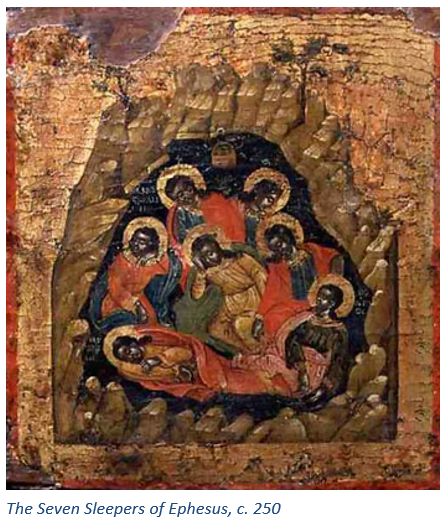 They shall take some of the blood [of the Passover lamb] and put it on the two doorposts and the lintel of the houses in which they eat it. ~Exodus 12:7 It may be easy for some of us to be dismissive of the sacrificial system of our religious ancestors. Here, after all, we seem to see the long shadow of a primitive and savage form of magic practiced to ward off an avenging God. Perhaps. But we may be wise to consider the savage log(s) in our own culture’s eye before we too quickly and casually turn up our own noses. What will future generations think of our consumptive ecological practices, our treatment of our most vulnerable, our constant warring, after all? The Seven Sleepers of Ephesus is also known in Arabic as “the people of the cave,” for the story is found both in the Christian and Islamic traditions. Fleeing persecution, they wait in darkness, sheltered by the rock, until it is safe to emerge. They will sleep 300 years and emerge when danger is gone. What if the indigenous cultures of our own continent had had that kind of safety? Or the migrants seeking a better life who are currently flooding into New York and other places, muddling our compassion with pangs of fear that there is not enough to go around. Consider the painted lintel not so much a magic shield, but a team banner, a political sign, a pride flag—a proclamation of allegiance, but one that is not easily swapped out, to something other than the menacing Pharaohs and their ways in our own day. “The mark of God’s claim upon Israel,” says Erica MacCreaigh in The Christian Century, “is enfleshed, the very stuff of life, not unlike circumcision. The blood proclaims the stakes, and its message to the world is unequivocal: We belong to God—body and spirit—and our allegiance is to God alone.” As Romans says it, “Owe no one anything, except to love one another” (13:8). This is, indeed, a currency of a very different kind than the transactions familiar to us in much of our life together here on earth. Enter into rest. Enter into hope. Enter into worship, Sunday, 10:00am, in-person or online. Readings: Exodus 12:1-14 † Psalm 149 † Romans 13:8-14 † Matthew 18:15-20 About the Art: Icon painting from the Cretan School of the Late Middle Ages (15th-17th centuries) developed under both Eastern and Western artistic traditions. Retrieved on September 5, 2023 from: http://www.mystudios.com/artgallery/C/Cretan-School/The-Seven-Sleepers-of-Ephesus.html.
0 Comments
Leave a Reply. |
worshipYou'll find here links to weekly worship and, where applicable archived service videos. Archives
July 2024
Categories |
 RSS Feed
RSS Feed